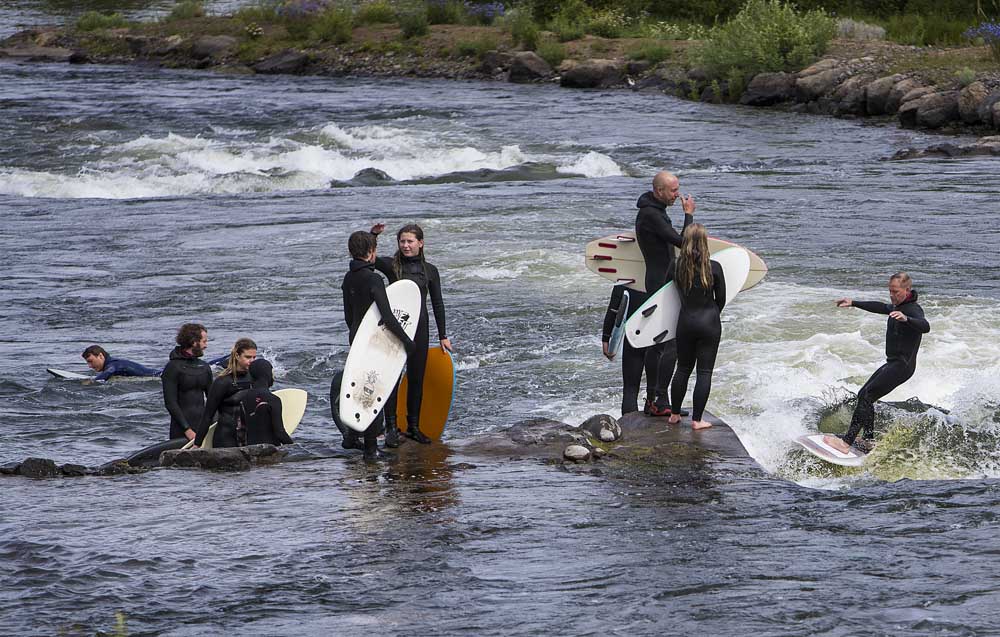Tiktok video stirs controversy over Bend surf wave’s use of water
Published 3:15 pm Tuesday, October 4, 2022

- Surfers gather to ride shortly after the wave at the Bend Whitewater Park in April.
A Tiktok video produced by a Wyoming lawyer about the Bend Whitewater Park is making waves in Central Oregon’s community of irrigators and river users.
In the video, Sarah Falen, an advisor to Jefferson County non-profit Perfect Balance, laments that farmers in North Unit Irrigation District are not receiving an adequate supply of water while Whitewater Park in Bend has water for surfers.
Trending
Water use in Central Oregon is increasingly controversial as a host of interests tug at the limited water resources flowing out of the Central Oregon Cascades. Farmers, anglers, environmentalists and other river users all vie for a slice of the limited resources, which have become even more scarce due to drought.
“I found the water that the Oregon farmers have paid for but don’t get to use and they are going out of business over because they can’t irrigate their crops — they are being completely sucked dry. It is right here in Bend, Oregon,” Falen said in the one-minute video.
“What we are complaining about here is if the farmers get to irrigate, this river fluctuates by six inches at max. And because of six inches, farmers in Madras are going out of business. Don’t get me wrong this area is beautiful but we need to get our priorities straight.”
The video, posted on Sept. 25, has generated more than 500 comments and over 10,000 “likes.”
A caption embedded in the video declares: “Yep, let’s put farmers out of business over six inches of water so people can surf on fake waves on the river. Obviously, recreation is more important than food.”
Falen’s video left administrators North Unit Irrigation District in Jefferson County perplexed.
Trending
“I’m not sure I understand the logic behind her statement that the waterpark is putting farmers out of business because the river fluctuates six inches?” said Mike Britton, executive manager for North Unit Irrigation District. “The water park does create operational issues for the irrigation districts at times but doesn’t prevent us from receiving the water we’re entitled to.”
Marty Richards, a farmer and chairman of North Unit’s board, said the drought has been difficult for all irrigation districts and patrons and the reduced allocations have increased stress among water users and irrigators.
“It is human nature to place blame. Especially when you have no control over the actual cause, Mother Nature,” said Richards. “One of the greatest threats to the viability of agriculture and the health of Deschutes river is misinformation.”
Following the release of the video, Bend Park & Recreation District, which operates the Whitewater Park, released a video on its Facebook page explaining the relationship between the park and the canal diversions that draw water away from the river.
“The Whitewater Park has zero effect on flows in the river. The amount of water that flows in up here at the top is the exact amount that leaves at the bottom. This park requires zero (additional) water to function,” Ryan Richard, the waveshaper, said in the video.
“It doesn’t take any water from the river it doesn’t add any water to the river. It gets all of its energy from nine feet of elevation drop,” he added.
Kate Fitzpatrick, executive director of the Deschutes River Conservancy, points out that the whitewater park is upstream of most irrigation diversions, including North Unit Irrigation District.
“Much of the water the whitewater park enjoys gets diverted downstream for (North Unit) and other irrigation districts,” said Fitzpatrick. “The whitewater park has no bearing on that or what the flows are in the river.”
As of Monday, the amount of water flowing down the Deschutes was 1,160 cubic feet per second above Bend. Below Bend, after water is taken out for irrigation, the river has a flow of 73 cubic feet per second. Those numbers indicate that approximately 90% of the water in the river is diverted by irrigators.
In a phone interview with the Bulletin, Falen said the real obstacle for farmers is the Deschutes Basin Habitat Conservation Plan, which is designed to keep more water in the river to benefit aquatic species, including the Oregon spotted frog.
Falen is part of the legal team that last year looked at options for changing the Conservation Plan.
In the interview with the Bulletin, Falen also claimed that water in the Deschutes River flows from west of Madras, through Bend and into Wickiup Reservoir. In fact the river flows from south to north.
“The Wickiup Reservoir was built specifically for farmers so that it can be canalled back north to those farmers, where they can use water for their crops,” she said. “Quite frankly we have been trying hard to find someone to sue over this and there isn’t anything, so we want to change public perception over how the Endangered Species Act works.”
Because of Falen’s apparent misunderstanding about the direction of the water flow, she also stated that sunscreen worn by people in Whitewater Park flows “downstream” into spotted frog habitat located between Bend and Wickiup Reservoir, and as a result, this water has an adverse impact on the species. In fact, frog habitat is all upstream from the Whitewater Park.
Falen adds that she not against recreation in the river or the Whitewater Park but struggles with the idea that there is water for the surf park but not enough water for farmers.
“I want to show people that the way the Endangered Species Act is being implemented for this species does not make sense,” said Falen. “I want to show people that if these farming communities go out of business there will be a very serious impact to their communities.”








